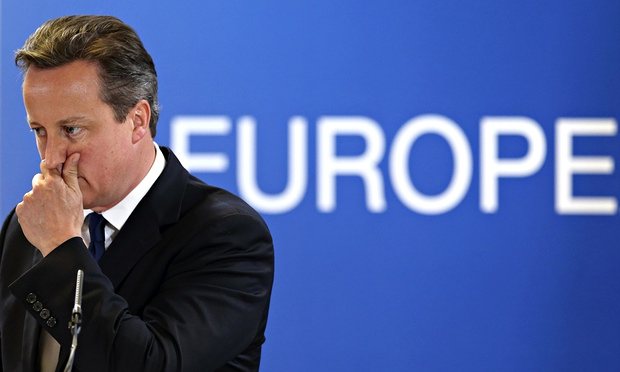|
So in many ways my life and career are a direct result of British engagement with Europe. In anticipation of the formal 1992 creation of the European Union, British banks started to evaluate their continental strategies and some, for the first time, embarked on recruiting graduates from across the channel. By sheer coincidence I ran into Barclays Bank at a job fair – not coincidentally in Brussels – and was asked to apply for their European Management Development Program. I did and so my first job application landed me right in the City of London, learning the ropes of banking at one of its more venerable institutions.
The interesting thing was that my new British colleagues ridiculed their nation’s and their employers’ European project and where somewhat miffed at all the opportunities and goodies that were thrown in the direction of the bank’s ten ‘Euro-recruits’. From day one I was lectured on the conspiracy coming from Brussels to subvert British freedoms, abolish pound sterling and eventually dismantle Westminster. This was long before immigration concerns and Nigel Farage. These were the last days of Margaret Thatcher whose career essentially ended over her views on Europe and the infamous campaign by The Sun newspaper to dispense some advice to the President of the European Commission on where to put his European Currency Unit as it was called in those days. Having grown up in a nation devastated by World War II where European co-operation was essential to economic recovery, there was never any debate, discussion, let alone an inkling that there might be something negative to say about European co-operation and integration. On the contrary, the late 80s were a time when the advent of the single market would bring more freedoms, riches and success for those that participated in it and my instant recruitment into London was the undeniable evidence of that. Critical thinking about the European Union was non-existent. Imagine my initial surprise at the British bitterness about it all. That said, it did change my thinking and my crash course in Euroskepticism allowed me to see that giving up your currency would mean giving up your ability to be the master of your own destiny as Greece has now painfully learned. Globalization is great and opens the door to many opportunities, but to hand its management to unelected bodies far removed from the nation state will inevitably open the door to some unintended consequences. Even with Thatcher disappearing from the scene, the debate in Britain raged on. And now, some twenty-five years later that British suspicion about the entire project has invaded many parts of continental Europe and has been adopted by emerging political movements on both the left and the right. Deep frustrations over unrestricted immigration and the economy at large are turbocharging populist sentiment and the EU is the first in the line of fire as an establishment project seen to have been instrumental in undermining the safety and security blankets that many across Europe had come to take for granted. Protest and anger are thus not only informed by evidence, but equally by ‘nostalgia’ something populist politicians love to plug into. So the Brexit vote should not come as a surprise at all despite the near hysteria that enveloped the media and markets almost immediately after the results were confirmed. The consequent demise of both David Cameron and Jeremy Corbyn were also long in the making, the Brexit vote just accelerated it. And as such last week’s events should be welcomed as a timely wake-up call for Europe to come to terms with deep economic shifts, nearby war and chaos (Ukraine, Syria) and the festering wounds inflicted by harsh monetary policies, again Greece, but who is next? European commissioner Frans Timmermans today on his Facebook page admitted that the time has arrived to be ‘brutally honest’ and that the Brexit vote is a symptom of the feeling that ‘we have lost control of our destinies’. As much as the vote shook up Britain, it will give an equal boost for re-examination in Brussels. So that is why we should welcome what happened in Britain last week. Although there will be quite some chaos in the weeks to come, think financial turbulence and purges in the British Labour and Conservative parties, there will and has to be a way out of this mess. It will consist of finding a ways to re-establish British relations with Europe, which will neither end nor remain the same, but more likely and hopefully will find some new middle ground. Britain cannot afford to let a referendum – a terrible tool to set a political course at the best of times – determine its future direction. Once the internal bloodletting is done, possibly followed by a general election, serious discussions can start without invoking the dreaded Article 50, which will set a timetable for a British exit. This process will help Europe find its balance and involve some serious re-examination on issues such as centralized governance, immigration, security and macro-economic policies. Yes, I refuse to believe that Britain is out and that we are headed for some sort of dark age. But even if that were to happen there will be a route to some new equilibrium. Things will not be easy, but at the very least we are all awake now and ready to participate in framing a new future for Britain, Europe and the world at large. My induction in global thinking decades ago in London does not allow me to believe otherwise. Postscript on July 7, 2016: it is of course quite extraordinary and maybe not coincidental that one of the very colleagues I referred to here and with whom I worked together in my first year at Barclays is none other than Andrea Leadsom (née Salmon), one of the two remaining contenders for the conservative leadership.
1 Comment
|
Archives
April 2020
Categories
All
|

 RSS Feed
RSS Feed